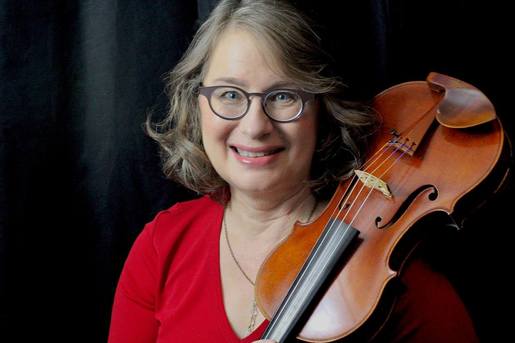Cora Cooper, editor

Dr. Cora Cooper is a Professor of Music at Kansas State University, where she teaches violin, viola, chamber music and string pedagogy. With graduate degrees from the Eastman School of Music and Florida State University, her teachers were Thomas and Evelyn Read, Charles Castleman, Peter Salaff, Eliot Chapo and Karen Clarke. She has also taken lessons with Linda Cerone and Simon Fischer, attended the Starling-DeLay Symposium on Violin Studies, and is certified in the Sassmannshaus method. Her work with music by women composers led to many performances at the Festival of Women Composers at Indiana University of Pennsylvania, and lectures in the United States and England. Other publications include an edition of duets by Maddalena Lombardini-Sirmen (with Karen Clarke), a duet/etude book by Josephine Trott, a volume of duets by Mozart’s contemporary, Joseph Gehot, and three volumes in a series of Classical quartets for young players, entitled Please Don't Let Them Play Mozart. She can be heard on the Da Vinci String Quartet recording of Charles Martin Loeffler’s Quintet in One Movement for NAXOS American Classics, and has had professional symphony experience with the Vermont, Austin, and Tallahassee Symphonies, and the Atlanta Baroque Orchestra.
She enjoys hanging out with her mini-labradoodle, Shivani, reading mysteries and trashy novels, and when she has time (rarely), quilting. Though initially dismayed to be sorted into Hufflepuff, she quickly realized the values of fair play, friendship, and cookies fit her perfectly.
"I began working on this anthology around 2003, spurred on by my curiosity about Josephine Trott [read her biography]. It was hard to believe that this person could have produced the Melodious Double Stops books and the piece The Puppet Show, then disappeared from the musical world. Who was she? Where was she from? What else did she do? Were there more like her?
It also struck me around this time that most of my college students had never played a composition written by a woman. That just didn’t seem right. I knew from previous research that there was a wealth of music to be found, but a paucity of music available to meet the needs of every level of playing. So, I went on a quest to find fun pieces in a variety of styles that, for the most part, weren’t currently available, and that would be playable by beginning, intermediate and advanced students. There would no longer be an excuse for feeling odd using the pronoun “she” for a composer!
In addition to finding pieces from the last few centuries, I wanted to include women writing today. Ellen Taaffe Zwilich and Libby Larsen were early supporters of the project, and I was able to find some young composers both in and out of school to make contributions as well. My aim was to include compositions reflecting a variety of styles and eras, as well as multiple levels of playing, in the collection. I also wanted to make sure the pieces were both pedagogically sound and musically rewarding. The volumes are organized around the grade levels described in the ASTA String Syllabus. Volume 1 (Beginning), corresponds to Grades 1 and 2, Volume 2 (Intermediate 1) corresponds to Grade 3, Volume 3 (Intermediate 2) with Grade 4, and lastly Volume 4 fits in with Grades 5 and 6. The books are not meant to be a progressive method, and most pieces are of a suitable length for recital/encore use. Creating the anthology was a nine-year project, including research and then inputting the music with Sibelius. I hope you find the pieces fun to play and teach!"
She enjoys hanging out with her mini-labradoodle, Shivani, reading mysteries and trashy novels, and when she has time (rarely), quilting. Though initially dismayed to be sorted into Hufflepuff, she quickly realized the values of fair play, friendship, and cookies fit her perfectly.
"I began working on this anthology around 2003, spurred on by my curiosity about Josephine Trott [read her biography]. It was hard to believe that this person could have produced the Melodious Double Stops books and the piece The Puppet Show, then disappeared from the musical world. Who was she? Where was she from? What else did she do? Were there more like her?
It also struck me around this time that most of my college students had never played a composition written by a woman. That just didn’t seem right. I knew from previous research that there was a wealth of music to be found, but a paucity of music available to meet the needs of every level of playing. So, I went on a quest to find fun pieces in a variety of styles that, for the most part, weren’t currently available, and that would be playable by beginning, intermediate and advanced students. There would no longer be an excuse for feeling odd using the pronoun “she” for a composer!
In addition to finding pieces from the last few centuries, I wanted to include women writing today. Ellen Taaffe Zwilich and Libby Larsen were early supporters of the project, and I was able to find some young composers both in and out of school to make contributions as well. My aim was to include compositions reflecting a variety of styles and eras, as well as multiple levels of playing, in the collection. I also wanted to make sure the pieces were both pedagogically sound and musically rewarding. The volumes are organized around the grade levels described in the ASTA String Syllabus. Volume 1 (Beginning), corresponds to Grades 1 and 2, Volume 2 (Intermediate 1) corresponds to Grade 3, Volume 3 (Intermediate 2) with Grade 4, and lastly Volume 4 fits in with Grades 5 and 6. The books are not meant to be a progressive method, and most pieces are of a suitable length for recital/encore use. Creating the anthology was a nine-year project, including research and then inputting the music with Sibelius. I hope you find the pieces fun to play and teach!"